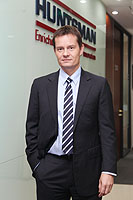| Huntsman Advanced Materials, a leading global manufacturer of epoxy adhesives, aerospace composites and electrical insulating materials, says its business in China will open a new chapter in 2012. Steen Weien Hansen, the company's Asia Pacific region vice president, talked with Beijing Review reporter Yu Yan about the company's future plans and shared its successful experience of doing business in China.
Beijing Review: How will Huntsman Advanced Materials open a new chapter in China?
 |
|
Steen Weien Hansen | Steen Weien Hansen: China's industrial upgrade creates a huge demand of advanced materials, and this means huge business potential for our company. Many key industries that China will be encouraging during the 12th Five-Year Plan (2011-2015) are the fields where we have strength in.
We have adjusted our business strategies according to the 12th Five-Year Plan. We will strengthen products for wind and solar energy, power transmission and distribution, and clean-energy vehicles. This decision is made based on the plan's emphasis on clean, safe and high value-added industries with strong ability to promote employment.
China is the most important market in Asia for Huntsman. Have you adopted any special strategies for China?
Yes, we have. We are quite China-centric in the Asia Pacific region. China is our most important market in Asia. If you look at our investments in the last two or three years, you can find most were in China. Our purpose is to achieve affordable innovation in the Chinese market, with regard to both high-tech and medium-range products.
Huntsman Advanced Material has made remarkable achievements in China. Is there any experience that you want to share with other foreign companies or foreign businesses in China?
First of all, it is critical to have strong local relationships with local governments, science institutes, customers and partners. Last year, we celebrated the 15th anniversary of our plant in Panyu, Guangzhou, capital city of south China's Guangdong Province. Also, we have local minority shareholders.
We are now building a new research and development center in the Minhang District of Shanghai. The new center in Shanghai will be a big, world-class research center with 355 working staff. It will open in the first half of 2013. This new center is also done in partnership with the Minhang Development Zone.
Another success criterion is to work with the local champions or successful local Chinese companies. Many international companies come to China because their Western customers open production in China. But in my experience, the long-term winners for both the Chinese market and exports will be the Chinese champions. Today they are leaders in China and in the future they will be global leaders.
As you mentioned, localization is very critical for foreign companies in China. Have you ever come across any frustrations in this regard?
There are two key rules doing business in China. First, everything is possible. Second, nothing is easy. Localization is a must, but there are many challenges. You have to attract skillful associates to work for you in a highly competitive working environment. That's challenging. You have to make people believe your vision and see the career development opportunities to work with you.
We are very fortunate that we have succeeded in this regard, because we give our working staff, even young starters, responsibilities very quickly. They have the chance to "learn by doing." | 